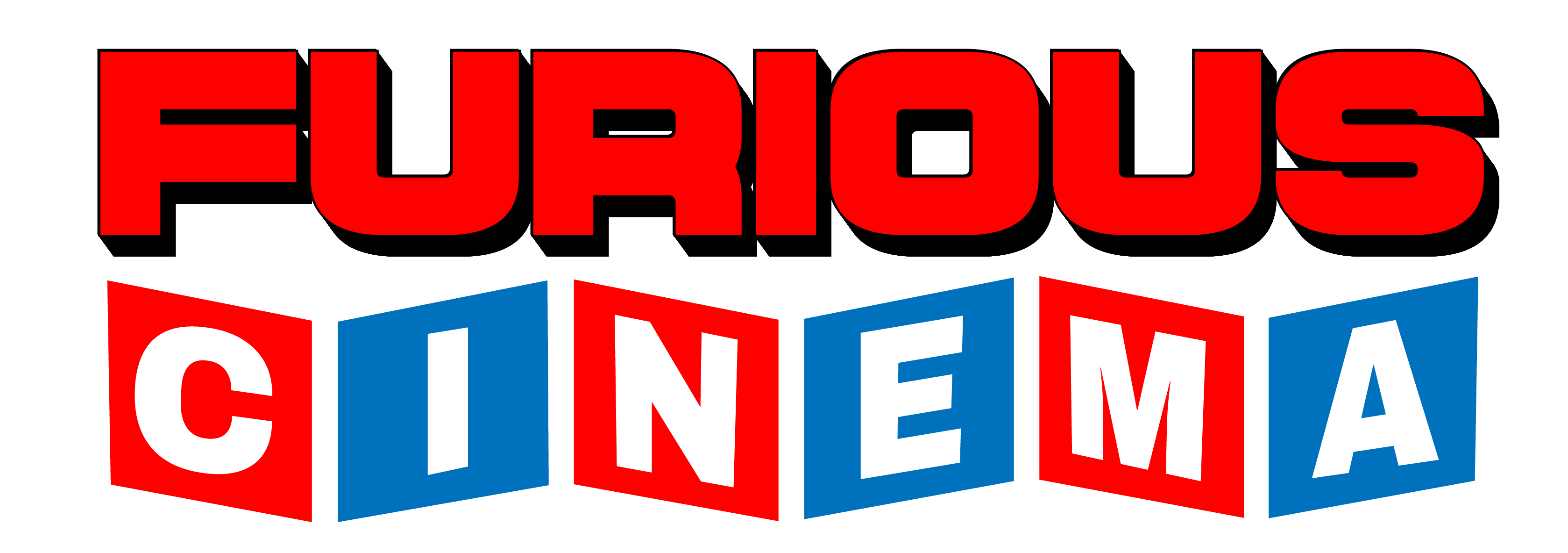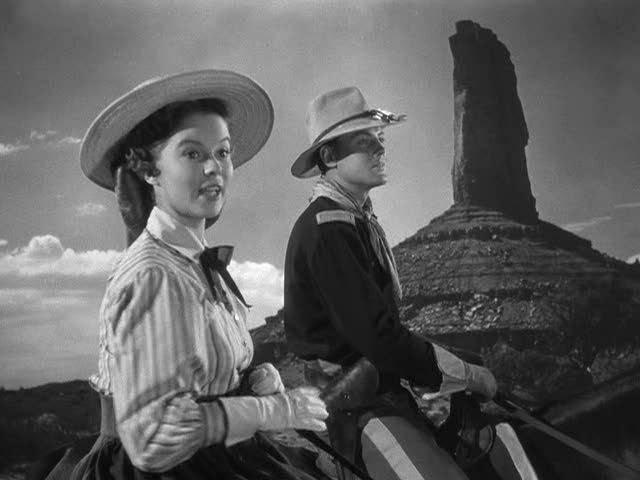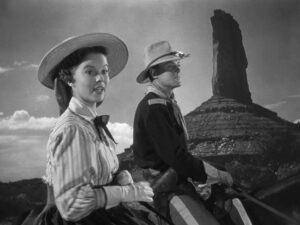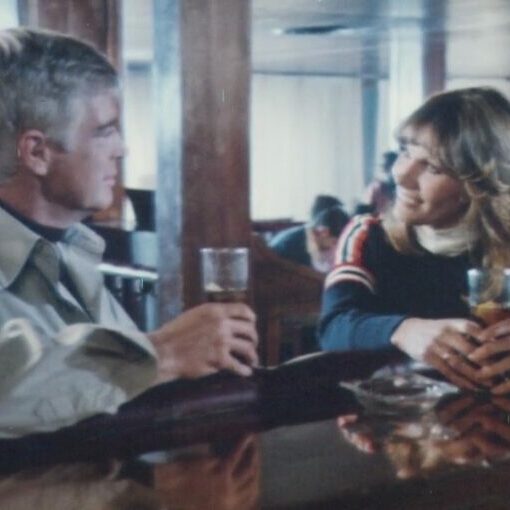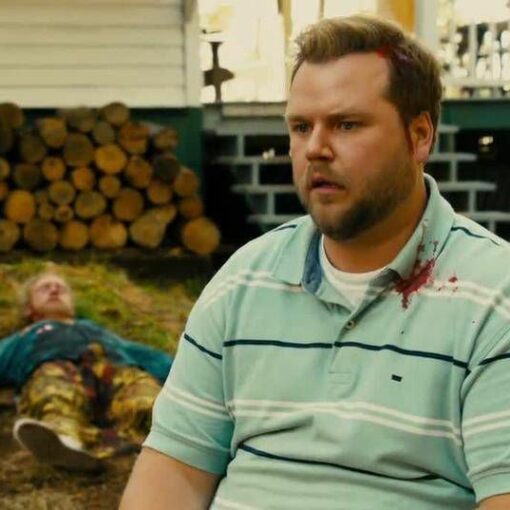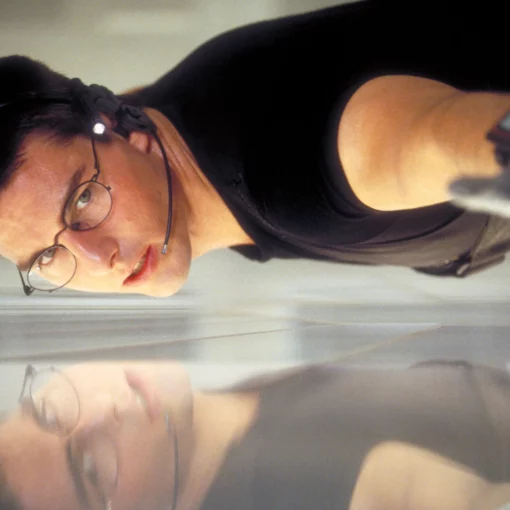Every now and then we at Furious Cinema turn to one of our favorite classic genres, the western. We’ve previously posted a list of 50 Furious Westerns, and to build on that, we’re launching a series of in-depth looks at some classics of the genre. No rules. This is the fourth guest post in the series by Simon Gelten (one of the most active writers on The Spaghetti Western Database), make sure you also read his previous articles.
Fort Apache, the first part of John Ford‘s Cavalry trilogy, is often described as Ford’s version of Custer’s Last Stand. The film tells the story of a cavalry officer, Owen Thursday, whose reckless tactics lead to the massacre of an entire regiment. It’s best known for the controversial ending, in which Thursday’s successor, his former lieutenant, not only covers up the man’s folly, but even makes a hero out of him.
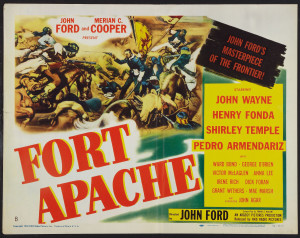
One of most unusual aspects of the movie, is the offbeat casting of arch-liberal Henry Fonda as the inflexible, upper-class commander Owen Thursday and the arch-conservative John Wayne as his more understanding, compliant lieutenant Kirby York (1). Cast against type, Fonda turns in a brilliant performance as the cold army general, demoted to the rank of lieutenant-colonel and banished to the frontier. One of the first things he says after his arrival, is that he is not a martinet. But that’s exactly what he is, a martinet: he suppresses his daughter’s romance because the man of her dreams is socially unacceptable, and ignores York’s good advice because he is used to give orders, not to have discussions.
When Thursday learns that Cochise is a name familiar to newspaper readers, he sees a chance to redeem himself and regain his former rank of general. After a few skirmishes, the Apache chief escapes with a large numbers of his followers to Mexico, and Thursday sends captain York across the border to arrange a peaceful meeting. But when the Indians arrive on the spot, Thursday refuses to negotiate with them on equal terms, and simply orders them to return to their reservation, knowing they will never obey the order. But the Indians have set their own ‘trap’, and when Thursday attacks, his troops are annihilated, except for York and a few other men, who didn’t take part in the charge.
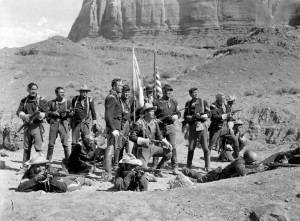
This may all seem a bit bleak and cruel for a Ford western of the forties, but it’ still classical western material. Renegade Indians, an arrogant cavalry commander, his knowing lieutenant, those are all western stereotypes, used over and over again in Hollywood westerns. But then, all of a sudden, when the film seems over, Ford comes up with this epilogue that puts things upside down and has puzzled critics as well as audiences ever since. It shows York, now commander of the fort, talking to some newspaper reporters. In front of a portrait of Thursday, he declares that ‘no man died more gallantly’ and that the men ‘are a better troop because of him’.
Fort Apache was based on short story by James Warner Bellah, called Massacre. Bellah was a veteran of both WWI and WWII, a hopeless romantic and authoritarian who was in love with the military. He thought that the honor of a regiment was far more important than the individuals serving in it. Bellah also was an admirer of Kipling and had his own ideas about Kipling’s “white man’s burden”. The Indians in his cavalry stories are inevitably presented as uncivilized and cruel, with a predilection of murder and rape (1). The twist ending, Thursday being promoted as a hero in spite of his inadequate behavior, is typical for Bellah’s writings.
What Ford must have liked in these stories, was this idea of the cavalry doing a dangerous but necessary job in a hostile environment. But Ford saw the cavalry, or better: the cavalry fort, as a safe haven, a warm place, a home and hearth. There were no female characters in Bellah’s story, so Frank Nugent and Laurence Stalling, who adapted the story to the screen, were asked (by Ford and the producers) to add a couple of female characters to the story (the most important of them would be Thursday’s daughter, played by a then 22-year old Shirley Temple). It wasn’t the only change that was made. Surprisingly (looking at the source material) Fort Apache became the first of Ford’s films that is more sympathetic to the cause of the Indians; in the movie they’re no longer uniquely shown as a menace, but as human beings with legitimate complaints about the society of the white man.
For Ford, the catholic, the Irishman, the cavalry was to the frontier, what the family is to society: a warm place in a dangerous surroundings. With much emphasis on daily life and the ceremonies and rituals within the confines of the army fort, the cavalry fort almost seems treated as a family entity, with commander Thursday as the family father. As said, this is all very different from the original story. This is Ford speaking, not Bellah. There will be bad families, and bad family fathers, but in Ford’s vision the family is a sine qua non in the process towards civilisation, with the father as an inevitable role model (2). Owen Thursday was not a good father (his stubbornness and lack of empathy ‘breaks’ the harmony of the army family), nor was he a capable commander, but at the same time was not a complete failure as either of the two: he loves his daughter and thinks he’s protecting her by suppressing her romance, and when all is lost, and he’s offered a horse (and a possibility to escape) by captain York, he returns to his men, proving that he at least is not a coward, and dying ‘gallantly’.
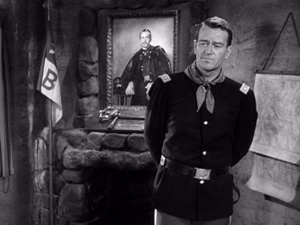
Like Nathan Edwards, the old Indian fighter from The Searchers, who must wander forever between the winds once his part in history is over (and the door has closed behind his back), the foolish and incompetent Owen Thursday knows this is where his part in history ends: to be remembered as an honourable man, he must die here. In Bellah’s story, the twist ending, with Thursday being promoted by York as a hero, is rather cynical. In Fort Apache it is repentant, contrite. We see bitterness in the face of Kirby York – who knew Owen Thursday personally – when he tells the newspaper men about the idealized image history has made of him. But like Ford, York knows that history isn’t always nice. And nor are the men by whom it is determined.
Fort Apache is not without flaws. Some of the more light-hearted scenes are more appropriate to vaudeville than serious filmmaking, but Ford uses them to illustrate the joyful atmosphere of daily life within the fort and luckily the more dramatic moments of the film are free from silliness. They’re also free of Ford’s (sometimes quite obtrusive) sentimentality. Actually, with a commander who deceives both the Indians and his own captain, Fort Apache is a quite bleak and violent film. It’s as if Ford was surprised by it himself. The other two parts of the planned Cavalry triptych, She wore a Yellow Ribbon and Rio Grande, although excellent films in their own right, would be more sentimental and traditional. Fort Apache is the first of Ford’s truly reflective movies, in which he examines the great myths of the West (and the films made about it): people need myths, he seems to say, but they also need insight in the way these myths were created. Therein lies the greatness of this movie, one of Ford’s richest and finest.
Notes:
1. Some sources mention that Fonda was offered the York part first, but yielded the more sympathetic part to his co-actor, preferring the more complex part of Thursday. See for instance: Allen Eyles, A Man a horse and a Gun, in They Went That-A-Way, edited by Ann Loyd, London 1982. This seems to make sense. Ford had been impressed by Wayne when Hawks had shown him an early copy of Red River, so it seems logical that he wanted him for the Thursday part. Red River was released in 1948 (like Fort Apache), but made two years earlier. Its release was delayed for financial and legal problems (see: Gary Willis, John Wayne’s America, p. 129; see also note 1, p. 334).
2. Gary Willis, John Wayne’s America, p. 165-168
3. See: William T. Pilkington, Fort Apache, in: Western Movies, edited by W.T. Pilkington and Don Graham
Buy BluRay: From Amazon.com | From Amazon.ca | From Amazon.co.uk | From Amazon.de
